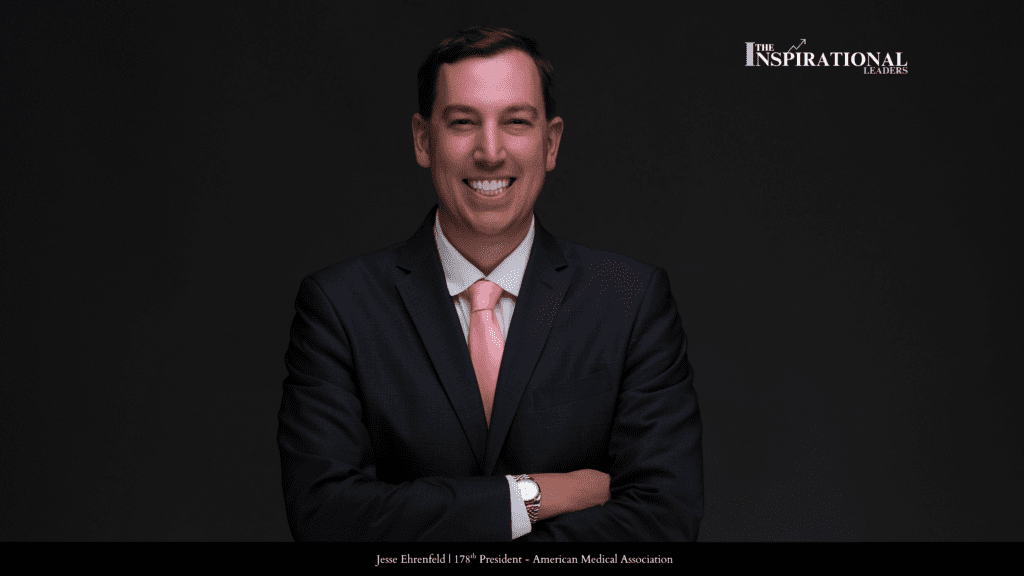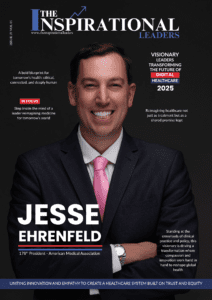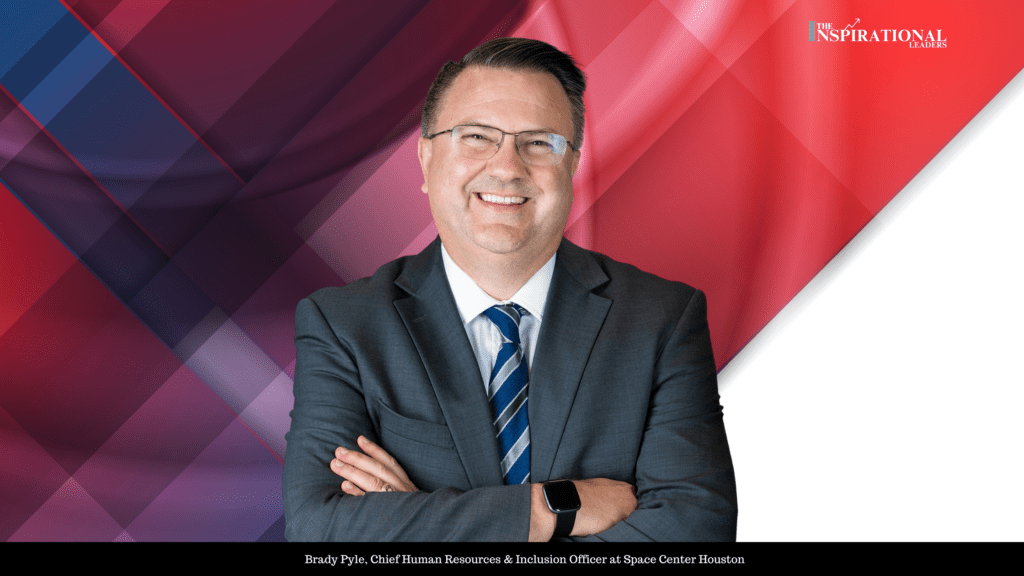As the 178th President of the American Medical Association (AMA), Dr. Jesse M. Ehrenfeld is navigating a pivotal chapter in the history of healthcare. Positioned at the crossroads of clinical practice, public policy, and cutting-edge technology, his leadership goes beyond traditional roles—it is transformative in scope. With a deep-rooted commitment to purpose and a steadfast belief in technology’s potential to uplift human health, Dr. Ehrenfeld is guiding a bold transition toward a more anticipatory, accessible, and ethically grounded healthcare ecosystem.
In this exclusive spotlight, Dr. Ehrenfeld—who also serves as Executive Director of the Advancing a Healthier Wisconsin Endowment—offers a comprehensive and pragmatic vision for reengineering healthcare through smart digital integration, responsible artificial intelligence, and reforms that prioritize the needs of both physicians and patients.
“My purpose has always been clear: to blend science with compassion, technology with ethics, and policy with human dignity. I believe in a future where healthcare empowers rather than overwhelms, where innovation serves people rather than replaces them. Every decision I make is rooted in the simple idea that health should be a universal promise — one we deliver together, with courage and heart.”
A Defining Period in Medical Innovation
The intersection of technology and medicine is revolutionizing care delivery, patient experiences, and the practice of healthcare itself,” Dr. Ehrenfeld begins, highlighting the magnitude of this paradigm shift. He predicts that the next five years will bring seismic changes to clinical environments. Innovations such as machine learning, real-time health monitoring, and precision-based digital therapeutics are already reshaping how care is conceived and delivered—but they are only the tip of the iceberg.
His vision for the future includes personalized, real-time management of chronic illnesses through wearables; AI-powered assistance in diagnosing complex and rare diseases with exceptional accuracy; and seamless integration of virtual healthcare into standard treatment protocols.
But in Dr. Ehrenfeld’s view, technology must serve a higher goal. “This isn’t merely a digital makeover—it’s an opportunity to rebuild the healthcare framework,” he says. “It’s about recognizing disease before it escalates, offering meaningful support in people’s daily lives, and leveraging data to make care more intuitive and humane.”
Rethinking Healthcare from Reactive to Proactive
Dr. Ehrenfeld is keenly aware of the financial and operational stress on the U.S. healthcare system. He strongly asserts that the current reactive care model is on the brink of collapse. “We’re running a sick-care model that can’t sustain itself. If we don’t shift toward proactive healthcare, the entire structure risks failing,” he warns.
He argues that digital health innovations must be crafted not for novelty, but for empowerment—empowering healthcare professionals to do their best work, and patients to take an active role in their well-being. Properly applied, these tools support early intervention, enhance care coordination, and promote sustained wellness. But above all, they must preserve the foundational trust between doctor and patient.
Technology should uplift the role of clinicians—not overwhelm them. It should expand access to care—not reinforce inequalities. And above all, it must be developed and used with ethical responsibility,” he underscores.
“We’re living in a moment where innovation isn’t optional — it’s essential. But these advances must always start and end with people. From real-time monitoring to AI-powered diagnostics, every tool we build should deepen trust, strengthen care, and create a system that sees and supports patients long before they ever walk into an exam room.”
Combatting the Widening Access Gap
Timely access to care is an escalating challenge in American healthcare. Referring to a 2025 AMA-cited survey, Dr. Ehrenfeld highlights a disturbing trend: the average wait time to secure a physician appointment in 15 major U.S. cities has climbed to 31 days—marking a historic high. This reflects a 19% increase since 2022 and nearly a 50% increase since 2004. Alarmingly, even cities with an abundance of physicians are not immune.
“These aren’t just administrative delays—they’re indicators of a healthcare system under intense pressure,” he says. “They signify workforce shortages, system inefficiencies, and lost opportunities for prevention.” He notes that while rural communities have long endured such challenges, urban areas are now experiencing similar strain.
Dr. Ehrenfeld views virtual care, AI-powered triage tools, and remote monitoring as essential solutions to lighten this burden. “We must build out digital infrastructure and push for supportive legislation to shorten wait times and guarantee care that’s timely and effective—regardless of where patients live,” he explains.
But solving access isn’t only about geography. “It’s about ensuring that digital health solutions are built with inclusivity in mind,” he adds. “Not every household has broadband. We must design with equity front and center to ensure every community benefits.”
Policy: The Framework for Responsible Innovation
In Dr. Ehrenfeld’s vision, while technology may propel transformation, it is sound policy that shapes it and keeps it grounded. “Policy isn’t just a tool for progress—it’s the architecture of trust,” he explains. “And trust becomes even more critical in a digital-first world.”
With a career dedicated to advancing evidence-informed policies, Dr. Ehrenfeld has consistently supported legislative action that expands access to telehealth, updates reimbursement frameworks, and ensures regulatory agility as new technologies emerge. However, he cautions against overly rigid policies that might stifle progress, particularly with emerging fields like AI.
“Federal and state laws must encourage innovation, but they must also maintain safeguards to protect privacy, uphold safety, and ensure equity,” he says. “It’s a delicate balance—but one we must get right.”
AI in Medicine: A Call for Transparency and Responsibility
The increasing role of artificial intelligence and machine learning in healthcare demands careful oversight, according to Dr. Ehrenfeld. One of his foremost concerns is a lack of transparency—especially when AI is used in clinical decision-making.
“As a physician, I should never be using a ventilator or device powered by an undisclosed AI system,” he asserts. “That’s what I mean by algorithmic accountability. We need clear visibility into the tools we use.”
Ethical AI, he insists, must be transparent, explainable, and designed with oversight. Clinicians should understand where the data comes from, how algorithms make decisions, and what potential limitations exist. It’s not just a technical concern—it’s about protecting patient safety and clinical judgment.
Equally important is training. “We must educate healthcare professionals so they can use AI effectively, safely, and responsibly,” he emphasizes. “Innovation is only helpful when the people using it are empowered to understand and trust it.”
Supporting Physicians in the Digital Era
Digital transformation presents enormous opportunities—but also real challenges, especially for physicians on the frontlines. Disruptions to workflow, disjointed systems, documentation overload, and training gaps are among the many barriers they face.
“Our goal must be to free physicians to focus on what matters—caring for patients, not wrestling with screens,” says Dr. Ehrenfeld. “We need to reduce friction in electronic health records, streamline workflows, and prioritize tools that integrate seamlessly into clinical routines.”
Physician insights are central to technological development. “When clinicians are part of the design process, the systems we build are more aligned with the realities of care—and far more humane,” he explains. “We must equip our workforce with the tools, training, and flexibility they need to succeed.”
Making Data Interoperability and Privacy Cornerstones of Progress
For healthcare’s digital future to be successful, Dr. Ehrenfeld insists that interoperability and data privacy must be non-negotiable foundations. Patients should be able to access their medical records easily, and providers must be able to exchange data securely across platforms.
“We continue to face frustrating barriers to real-time, secure data exchange,” he says. “But if we want to modernize care, seamless interoperability is essential.”
He advocates for open technical standards, better data portability, and ensuring that patients retain control over how their health information is shared. However, he also warns that current privacy protections, like HIPAA, are insufficient in an age of consumer health apps and third-party data collection.
“We need data security protocols that go beyond outdated laws. According to him, privacy must be integrated right from the outset—not considered later.
Engaging Physicians in Every Phase of Digital Adoption
The cultural shift toward digital health can be as difficult as the technological shift itself. Dr. Ehrenfeld emphasizes that physician participation is essential in overcoming resistance, addressing concerns, and fostering trust.
“The only way to address physician hesitancy is by including them at every step,” he says. That includes participating in tech development, testing usability, refining policies, and guiding ethical practices.
“When physicians lead, the results are more meaningful, more efficient, and more aligned with the patient’s experience,” he explains. “This is the path to a healthcare system that’s technologically advanced, but also deeply humane.”
Leading with Purpose in a Digital Future
Even while championing innovation, Dr. Ehrenfeld remains anchored in timeless healthcare values. “Technology is the future—but our mission must always remain human,” he reflects. Compassion, equity, and service are his guiding lights.
He remains immersed in the broader conversations around ethics, science, and public policy—but never loses sight of the real people impacted by these systems.
A Word for Tomorrow’s Leaders
Dr. Ehrenfeld inspires upcoming healthcare leaders with a clear message: while artificial intelligence won’t take the place of physicians, those who embrace it will outpace those who do not.
He believes the future will belong to those who integrate ethics with innovation, empathy with efficiency, and who see beyond tools to the people they serve. “The future of healthcare requires collaboration—among clinicians, innovators, policymakers, and patients alike—to build a smarter, fairer, and more connected system.”
A Vision to Inspire Progress
Dr. Jesse M. Ehrenfeld isn’t just witnessing the digital transformation of medicine—he is actively shaping it. Through his national leadership role and his unwavering commitment to equity, innovation, and ethics, he is helping chart a path where digital healthcare is not only technologically advanced but truly patient-centered, inclusive, and sustainable.
In his own powerful words:
“Together, I believe we can harness digital innovation to build a future where health is not a luxury for a few—but a shared promise kept for all.”
Beyond the White Coat: The Heart Behind the Mission
When we think of healthcare leaders, we often focus on the groundbreaking innovations and big decisions that shape the future. But behind every visionary stands something even more powerful — the quiet, everyday moments that anchor their purpose and remind them why they do what they do.
For Dr. Jesse M. Ehrenfeld, that anchor is family. Whether he’s guiding national policy or championing digital health on the global stage, his most meaningful role begins at home. These photographs capture the purest side of his journey: the laughter, the small gestures, and the shared joy that inspire his work far beyond any headline or title.
Family isn’t just a support system for Jesse — it’s a constant source of perspective. It’s what keeps his mission real and personal, reminding him that every patient, every policy, and every innovation touches someone’s loved one. His vision for a smarter, healthier future is ultimately about ensuring that every family can feel secure, seen, and cared for.
In these intimate glimpses, we see not just a leader, but a father, a partner, and a person deeply committed to building a world where health is more than a service — it’s a shared promise.
These moments tell the story behind the story: a leader driven by love, guided by purpose, and fueled by the simple, powerful joy of family.
“At the end of the day, it’s family that gives every big idea its true meaning.”




